Global Stage Podcast
 About the Episode:
About the Episode:
Show Notes:
To begin, Marianne shares how democratic erosion or backsliding is not an abrupt collapse of democracy, but a slow death of democratic norms and practices. The whole picture shows the challenge for democracy and one can find democratic erosion in all regions of the world, and in both smaller and larger democracies. To end democratic erosion, thinking about the erosion itself and considering what is happening during democratic erosion are essential. Most people think that stopping the erosion is the solution, but stopping is not the same as reversing it, nor does it imply the recovery of democracy, which often requires the reconstruction of democracy. It is not easy and requires the reworking of undermined institutions and new guard rails to be installed. One of her guiding questions is: what post erosion trajectories are possible, and can democratic recovery successfully occur or why would it fail? She prefers the term “democratic erosion” to “democratic backsliding” because it indicates a gradual hollowing out of democracy and doesn’t imply a return to an earlier state.
In addition, Marianne discusses how she worked as a political journalist and as a political writer and speech writer for 10 years before going into academia. Her research project reflects this personal background because she has an understanding of what really happens in political life, and how what the media portrays doesn’t always translate to the public sphere. She also was president of the International Political Science Association (IPSA), an outgrowth of her commitment to the service to the political science community itself. This organization represents a very important message – building bridges to all regions of the world with the mission of inclusion with all regions reflected. She says empirical analysis is necessary for this mission to be accomplished. She also discusses the political climate of the United States and how democratic erosion could start again. She is determined to draw lessons out of the current political climates around the world and to relate them to concrete political solutions.
Links:
- Learn more about Marianne Kneuer.
- Learn more about the Kellogg Institution for International Studies
Listen:
Listen below, ask your smart device to “play Global Stage Podcast,” or find us on:
Apple | Spotify | Stitcher | iHeartRadio | TuneIn | YouTube





